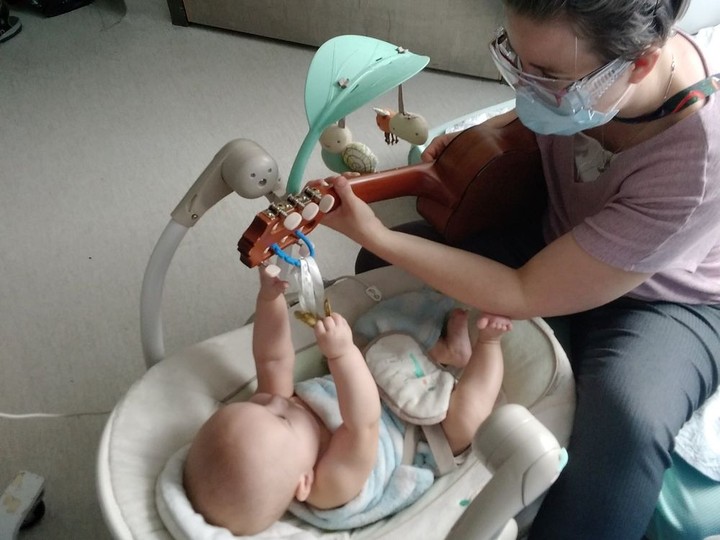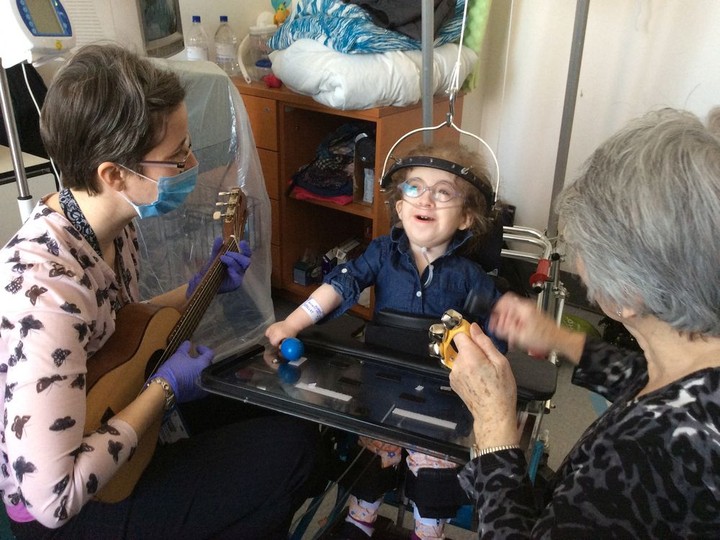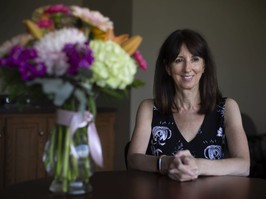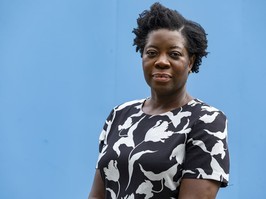music as medicine at the montreal children's hospital
three therapists use instruments and voices — and parents — to reach kids "where they're at" and promote healing and a feeling of safety.
we apologize, but this video has failed to load.
try refreshing your browser, or
tap here to see other videos from our team.
tap here to see other videos from our team.
by: hayley juhlthe baby was about 18 months old and in the arms of his mother. he was afraid of hospital staff, who all look the same in their masks and goggles.pascale comeau stood at the door to the hospital room and selected wind chimes from his music cart. the sound resonated with the child and comeau eased his way into the room, getting closer and closer. eventually he gave the wind chimes to the child’s mother. within 20 minutes, the three were making music together.a 10-year-old was experiencing frustration, anger and agitation. “he needed something like a big drum that was able to receive that intensity and not be destroyed by it,” comeau said. “it was important to choose an instrument that could hold his expression.”a 12-year-old child was dying, and comeau was there with the child’s parent. “she started choosing at first songs for her child. but then she chose songs for herself. i played hotel california, a place that you can never leave.”comeau is one of three music therapists at the montreal children’s hospital. music therapy is used to address physical, cognitive, social and emotional issues in patients. it transcends language, engenders a calming atmosphere in a stressful setting and can lessen the perception of pain. using instruments refines motor skills and, at the developmental level, children who are hospitalized for a long time can learn from the same songs they’d otherwise hear in kindergarten, like old macdonald.it is an active therapy, but in cases where a child is too sick to participate, they can receive the music. their faces relax, comeau said, and their heartbeats and breathing will slow.comeau and his colleagues christelle jacquet and julien peyrin use bells and drums and voices — and parents.“most of the children i see are under one,” said jacquet, who works in the neonatal intensive care unit. she uses a systemic approach, bringing parents into play, guiding them in healing techniques and helping them deal with their own feelings.“it’s using music to reach babies where they are and discovering how we can help with their development and make their experience as positive as possible,” jacquet said. “i can empower parents, which impacts their relationship with their baby but also with the team that works with them during the hospitalization. it’s fascinating how everyone brings a piece of the puzzle to help the baby grow despite all the unforeseen obstacles.”
advertisement

jacquet begins the process by gauging a baby’s response to her voice. delicately and following the queues of the baby, she cradles the child to replicate the feeling of being secure in the womb. she keeps her eye on the child’s vital signs to ensure she isn’t overstimulating them.if all goes well and if the baby is old enough, she’ll add guitar to the mix.during medical procedures, she helps keep babies calm and comfortable “so they can go on with their day and keep as much energy as possible for breathing and eating and learning.”in the psychiatric ward, peyrin works with teenagers admitted to the hospital who have very low self-esteem. most of them have suicidal ideation or plans. “music is a vehicle for positive and negative feelings,” he said. “the effect of sad music can be a vicious circle, but we try to help them use music in a healthy way.”teens in his care can record themselves rapping, singing, playing or simply talking about music. he has only a short time with them — he sees them twice a week and they are rarely admitted for more than three weeks. in that time, he builds a musical foundation and makes suggestions for songs that are calming.“the kids love billie eilish,” he said, “so we analyze her lyrics and look at how her words resonate with them. then we can build personalized audio playlists with music and nature sounds — they can use this during their hospitalization, but also when they go home. they can use music as a protection … their safety zone.”like peyrin, comeau uses structured improvisation to help children select the instrument that will best contain their feelings and decrease their pain levels. they begin by matching the child’s level of intensity so they can move toward a calmer state of mind and begin to change the mood.

advertisement
“i have in mind a 14-month-old baby who kept crying and crying and crying,” comeau said. the nurses didn’t want to overmedicate the child. “i went to see the baby with my big drum. and i started rhythmically playing and vocalizing. within 30 seconds, the baby stopped crying. the external stimulus got stronger than the internal stimulus.”all three stress that they are musicians first and a background and appreciation for quality instruments informs their therapy. their part-time salaries and equipment are paid for through the montreal children’s hospital foundation, which has supported their need for good tools. beyond instruments, they have computers and recording equipment including a specialized microphone for recording heartbeats.those heartbeat recordings are a memory-building exercise they use mostly with children who are close to dying. “the parents can choose a melody or a song that is significant that reminds them of their child and we layer the sound of their child’s heartbeat on top of the music,” comeau said.“it takes them a while to listen to it” after their child has died, jacquet said. “you hear the heartbeat and even if it’s not your child, it’s something that’s very powerful. often families listen to it on the first anniversary of their child’s death or on the first birthday they missed. it gives them something very natural that they can keep their whole lives and share with siblings who might have been too young to understand” or never got a chance to meet their baby sister or brother.“there are situations where the medical staff can’t do anything and they feel helpless. when nurses know it’s a good time to record — that there isn’t a lot of noise in the room — they just feel that relief to have something to offer the family. they position the recording stethoscope and they might say, ‘oh, we need some suction so we can hear the heartbeat better.’ it’s a team activity and we can bridge our fields.”

advertisement
during therapy sessions, the doors are open and music travels, having an environmental impact on the ward. after she has been working in the nicu, jacquet said she can feel the change in energy at the nurses’ station: “we share the heaviness, so we must share the lightness.”“there’s so much noise in a hospital and it’s so important to have that bubble where we can have some exploration and connect and share music and travel, escape the room, pretend we’re somewhere else,” jacquet said.“to find a place that has hope and freedom where kids can be kids and not just patients. music can be that for them.”hjuhl@postmedia.comtwitter.com/hjuhl
 5 minute read
5 minute read





